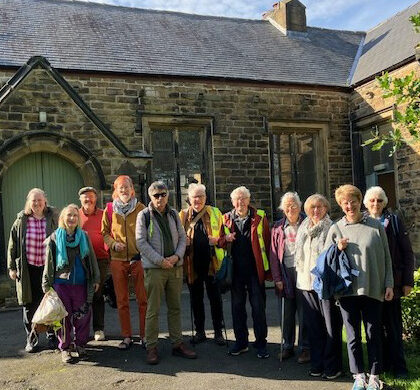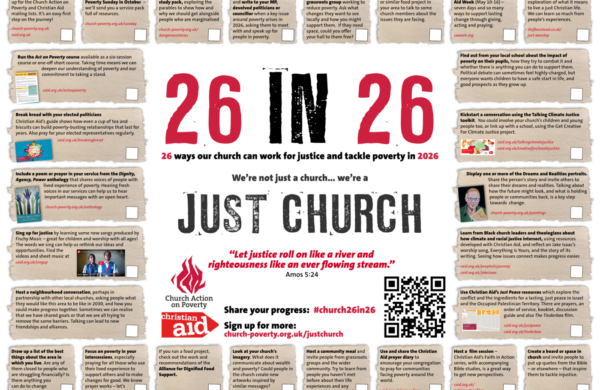Where are the margins?
A report from our 30 April online discussions on what it means to be church on the margins during the pandemic.
Reflection by Stef Benstead
What groups of people are on the margins? [people who lack the resources to change their situation]
- People with disabilities (currently difficult to access care)
- Travellers
- Migrants
- People suffering domestic abuse
- Children experiencing abuse
- People in care centres (cut off from society)
- People in food poverty
- LGBT+
- Homeless (new homeless in London – hospitality workers)
- Single parents
- People who are isolated/alone
- People with no access to technology
- Trans people
- People who have had difficult experiences of church
- People who are ‘othered’ – people who are talked about, not to.
- Black and minority ethnic people (disproportionately affected by the virus)
- Women
- Digital exclusion
- Addicts
- Prisoners/ex-offenders
- Destitute asylum seekers
- Sex workers (especially in current crisis)
- Individuals and families on zero-hours contracts, on the breadline
What causes marginalisation?
- Social and economic systems exclude people, e.g. education. … the structures of our society create margins.
- We need to aware that people may be labelled as marginalised and don’t want to be labelled as such.
- The church has gone online but disabled communities have been ‘doing and being’ church online for years, having been excluded from ‘mainstream’ church.
- How does the church marginalise? Is the church at the centre?
- We can learn from the methods of the Poverty Truth Commission. Church leaders can learn from a PTC – hear the experiences of people in poverty.
- Maybe the church needs a (Poverty) Truth Commission – the meeting of leaders and church members to share experiences and talk honestly about church. An opportunity for people to be heard.
- The church is not marginalised. …. The priest is ‘in charge’.
- For some the economic gap has drastically narrowed. People have suddenly found themselves in difficult situations.
- Some people are unwilling to engage with technology and so are cut off from online activity and community.
- Some people have to comply with systems to get what they need (e.g. PIP), others (richer and powerful) do not have to comply.
- Jesus crossed borders, challenged what was socially acceptable.
How could you move to live, work, be alongside people on the margins?
- ‘We need to go to people on the margins, not wait for them to come to us.’
- We need to adopt relational approaches, befriend people where they are (not expect them to come to church).
- Meet in informal settings, e.g. pubs and cafes.
- Meet online, where many marginalised communities already gather.
- Listen to people who are angry and hurt.
- Admitting our mistakes when we get it wrong (as a church).
- Connecting with LGBT+.
- Bring people together for a shared meal (e.g. people from low-income and more affluent communities).
- Some (Anglican) churches are struggling with ‘resources churches’ taking over in their local area, lots of funding allocated to resource churches.
- Work with local people who have good local knowledge and skills (e.g. Sikh shopkeeper who knows the neighbourhood very well, helping with food provision).
- Some church leaders/hierarchy are currently advising clergy not to deliver food, etc. other people in the community are just getting on with it.

Research and Information Officer
Pilgrims call for more support in low-income neighbourhoods
Bob Rae reports on Sheffield Church Action on Poverty’s annual pilgrimage Anti-poverty campaigners in the Sheffield neighbourhoods of Firvale, Wincobank and Firth Park are calling for major improvement …
26 in 26: The new social justice poster for churches
Justice is integral to our faith. Church Action on Poverty and Christian Aid have teamed up to produce a new poster that your whole church …
How should churches address rural poverty?
How is rural poverty changing, and how should churches, dioceses and Government respond? Paul Phillips explores the issue, and reports on his diocese’s work. In …
Faith In The City: why it still matters, 40 years on
In a new book, authors Terry Drummond and Joseph Forde revisit the landmark Faith In The City report, 40 years on. Faith in the City, …
Pantries reach 1 million visits – as new research proves they work
Community breakfast held to mark millionth visit New research shows Pantries improve people’s health, reduce worries and reunite communities Thank you for your amazing support! …
Grief is hard enough: it’s time to improve funeral support
Lindesay Mace from Quaker Social Action outlines their latest work to help people with funeral costs Bereavement can be a deeply challenging experience. In the …
New toolkit: Hosting a regional anti-poverty roundtable
Our new roundtable guide will help churches or dioceses to host productive regional events We’ve published a new resource for churches and dioceses who would …
Review: The Perils of Universal Credit
Ellie Malhotra reviews a new play, a much-needed wake-up call for change that restores power to voices that are too often ignored. Tucked away above …
Pilgrims call for more support in low-income neighbourhoods
Bob Rae reports on Sheffield Church Action on Poverty’s annual pilgrimage Anti-poverty campaigners in the Sheffield neighbourhoods of Firvale, Wincobank …
26 in 26: The new social justice poster for churches
Justice is integral to our faith. Church Action on Poverty and Christian Aid have teamed up to produce a new …
How should churches address rural poverty?
How is rural poverty changing, and how should churches, dioceses and Government respond? Paul Phillips explores the issue, and reports …



